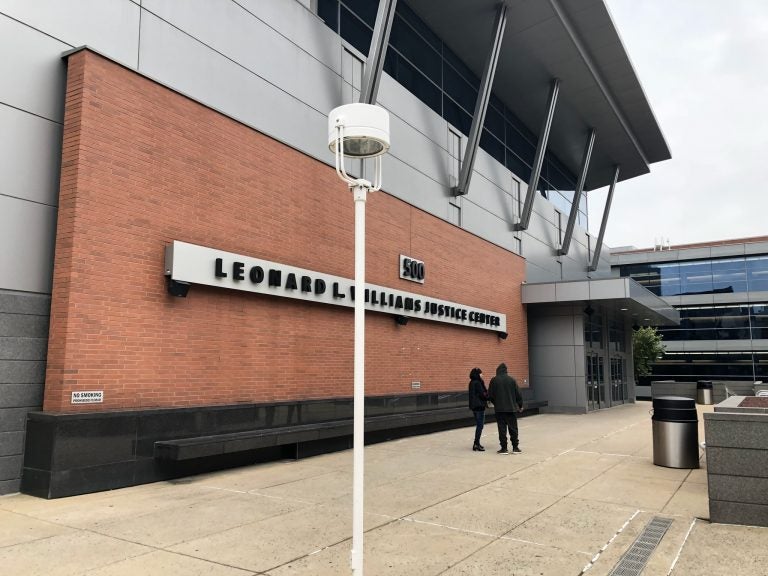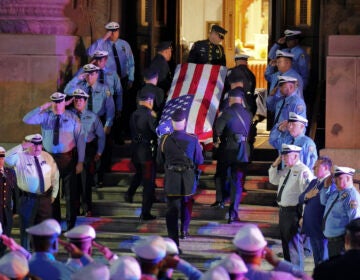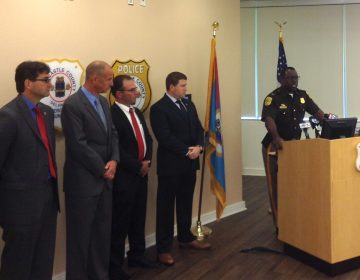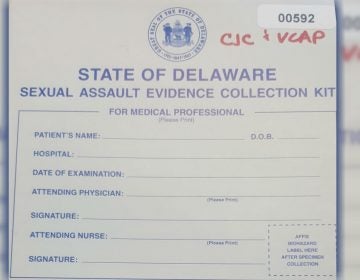‘Star witness’ testifies against fellow Delaware inmates in fatal prison hostage siege

A 12-member jury are deliberating charges against inmates allegedly involved in a prison riot (Cris Barrish/WHYY)
A convicted murderer who once headed a notorious Baltimore prison gang testified Friday for Delaware prosecutors against four fellow inmates in their murder trial stemming from an 18-hour uprising last year.
Correctional Sgt. Steven Floyd died of blunt force trauma and stab wounds in the Feb. 1-2 riot and hostage siege.
Since Monday, inmates Jarreau Ayers, Deric Forney, Roman Shankaras, and Dwayne Staats have been on trial at the Wilmington courthouse.
It is the first of four trials on charges of murder, riot, kidnapping, assault and conspiracy against 16 inmates of tier C in the medium-maximum security building at the James T. Vaughn Correctional Center near Smyrna.
Royal “Diamond” Downs testified Friday that he didn’t participate in any violence, only taking part in negotiations with officials after the attack because, he said, someone needed to step up.
Downs, 53, was the second inmate to testify in the case, but one defense attorney has called him a tainted “star witness’’ who got a cushy plea deal. He is already serving a life sentence and prosecutors are recommending a sentence of up to three years for a single charge of riot that he pleaded guilty to earlier this year.
“He was probably the one who ordered the final hit on Floyd, and now he’s working with the state,” said defense attorney Jason Antoine, who represents Shankaras, during opening statements Monday.
At the Delaware prison, Antoine said, Downs was the “head honcho inmate.” Known as the “OG” (Original Gangster) by other inmates, Downs has the power to order hits, Antoine argued.
‘Something had to be done’
Before Friday, the state had shown several photographs from the scene and called correctional officers and a prison counselor to testify about the bloody standoff.
On Friday, prosecutors put their case in the hands of inmate witnesses.
Downs testified he was moved from Maryland to the James T. Vaughn Correctional Center near Smyrna in 2003.
In Baltimore, where he was incarcerated for murder and other offenses in 1991, Downs said he headed the Black Guerrilla Family, a prison gang that virtually ran that city’s jail. In recent years, several members were convicted of conspiring with guards to smuggle drugs, phones and other contraband into the Baltimore prison.
Despite his reputation from Maryland, Downs said he has tried to be a cooperative inmate in Delaware and a voice of reason for other inmates.
He testified that several fellow inmates began talking about “doing something” a few months earlier. Those in the talks included Shankaras, Staats and Ayers, he said.
“It wasn’t about taking over’’ the tier, he said in response to a prosecutor’s question. “The discussion was pretty much to stay in the yard and let them come in the yard and let them come get us.”
He said he argued for staying in their cells one morning instead. That wouldn’t result in discipline.
If they protested in the yard, he speculated, they would be disciplined and beaten by guards.

“Something had to be done,’’ Downs said, describing how prisoners were routinely the recipients of “disrespect’’ from correctional officers and administrators. “It was in agreement to stage some sort of protest at the time.”
Downs, a bald, burly man with a thick black-gray beard, said other prisoners often confide in him.
“People respect, I guess, my outlook on things,’’ he told the jury.
On the night of Jan. 31, Downs said he learned from Ayers, whom he called Ruck, that Shankaras, whom he called Rome, had told him they would be taking over Tier C the next morning.
He said he was told they were going to overpower guards, but didn’t provide any other details.
Early on the morning of Feb. 1, Downs testified, he wrote a warning note that he threw out of the cell block in hopes of getting a guard’s attention. No one picked it up, so he retrieved it.
But he stressed, “I was in disagreement with [the takeover] from jump. I was in opposition to the whole thing.”
The attack began at 10:30 a.m. and ended about 5 a.m. the next morning when authorities stormed the cell block and found Floyd dead. His body was discovered under mattresses in several inches of water. Floyd was posthumously promoted to lieutenant.
Court adjourned before Downs could give his own blow-by-blow account of the riot or testify more about the alleged involvement of the four men now on trial.
‘They stabbing a cop’
Early Friday, inmate Anthony Morrow testified that he saw several others attacking Floyd and another correctional officer in the opening minutes of the siege.
Morrow, who said he is serving time on a gun charge and has a previous robbery conviction, was not able to identify the four inmates now on trial as culprits in the attacks.
On Friday, Morrow said he was using the barbershop phone about 10:30 a.m. and talking to his girlfriend before going to educational classes. Then he heard booming noises and shouting and thought it was inmates fighting because “we fight all the time.”
Then Morrow looked outside the narrow window to see an unidentified guard and then Floyd being beaten down the hall at the doorway to Tier C.
“They stabbing a cop,’’ Morrow told her, using the name he used for correctional officers.
He testified that Floyd was on the ground in a defensive position, trying to protect himself while under attack.
Morrow told the woman he wasn’t surprised “because the cops keep spraying people, beating on them, disrespecting them, talking about their families. This is the shit that goes on.”
After the conversation, he bolted from the barbershop.
“I saw a bunch of people running. Everybody was trying to get back to their cells,’’ he testified. “It was chaos.”
He observed more of the beatings and then hustled to another tier, where he remained until later in the day, when he was taken outside to a recreation yard with other inmates.
While watching the violence, Morrow testified that he “wasn’t looking at anybody’s face. It was a crazy situation.”
Under cross-examination, Morrow reiterated that he couldn’t identify any of the four defendants now on trial.
Prosecutors then called Brett Smith, a prison hostage negotiator who spent several hours talking with Downs and other inmates on a walkie-talkie.
Smith identified Downs as the one who recited various demands, such as better education programs, professional training for officers, revised inmate classification system, budget transparency and better visitation quarters, calling the current ones “dehumanizing.”
Smith’s testimony became tedious when members of the defense began playing portions of his recordings with inmates, much of which was unintelligible.
But Smith identified Downs as the primary inmate with whom he spoke.
Asked on cross-examination if Downs appeared “to have knowledge of where Floyd is and appeared to have control of the situation,’’ Smith said yes.
WHYY is your source for fact-based, in-depth journalism and information. As a nonprofit organization, we rely on financial support from readers like you. Please give today.





